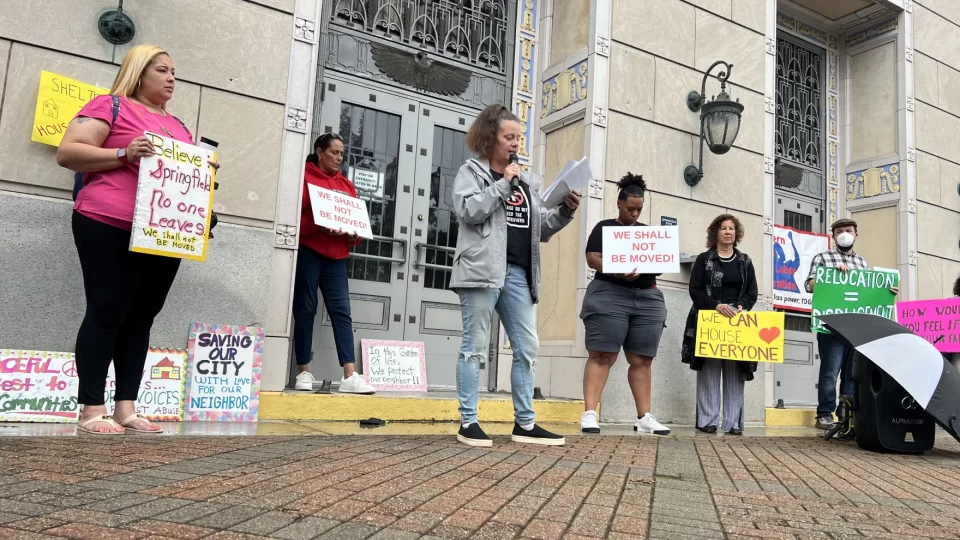
August 5, 2024
Latest changes to Massachusetts emergency shelter system go into effect today
BY WAMC Northeast Public Radio
Changes to the emergency shelter system in Massachusetts go in effect today – including policies on who gets priority when seeking emergency assistance shelters. The changes, which some critics say diminish the state’s right-to-shelter policies, were the focus of rallies in both Boston and Springfield earlier in the week.
Outside the Springfield State Office Building on Dwight Street Monday, activists and housing advocates criticized new rules for those seeking emergency shelter.
Last week, the Healey administration announced changes were coming to how placements in the shelters are prioritized. Among them – families left homeless due to no-fault evictions, unusual circumstances such a fire, or if one member is a veteran would receive priority in the system.
Other criteria were mentioned, but among the changes criticized by groups such as Springfield No One Leaves and Arise for Social Justice are “temporary respite” centers – and the implications if families who are not prioritized use them.
“The newest policy says that, if you’re desperate enough that you’re going to take five nights at a respite center that we’ll offer you – after that fifth night, you’re going to have to leave, and you’re not going to be able to get into shelter for six months more than that,” said Catherine Ady Bell, a staff attorney with Central West Justice Center. “And that’s ridiculous.”
According to the Healey administration, “safety-net sites” on the eastern side of the state, including Cambridge and Lexington, will be “transitioned to temporary respite centers.”
Effective Aug. 1, families who use them and the five days of shelter offered will then be required to wait at least six months for placement in the state’s emergency family shelter system.
At a press conference shortly after the announcement on July 23, Healey told reporters her administration is “not going to abandon anyone” with the changes.
She said the state has been trying to remedy “capacity issues” experienced by the EA system – especially as a number of migrant families arrive in the state, where a 1986 right-to-shelter law has guaranteed shelter for homeless families without restrictions in the past.
“As part of the effective, and I think, responsible management of that, we are offering people either opportunities to try to secure housing here – we’ve worked already on work permits – but we also offer them the alternative path that they may wish to go to family members or ones they know elsewhere – communities elsewhere in the country, and I think that is a humane and appropriate thing to do,” Healey said.
Audio from the conference is courtesy of the State House News Service.
Late last year, the state’s shelter capacity was capped at 7,500 families, or “approximately 24,000 individuals,” amid the governor declaring a state of emergency and calling for federal assistance amid an influx of migrant families.
Leading Monday’s rally against the changes, Springfield No One Leaves Director Rose Webster-Smith says the crisis has been ongoing even before large numbers of migrant families began arriving in the Northeast.
“For over 40 years, the state has funded the emergency assistance shelter to eligible families to make sure children do not have to sleep in unsafe places,” she said. “That shouldn’t change. We had a housing crisis and a shelter crisis long before migrants came.”
Webster-Smith and other advocates warned how the policy change could lead to hundreds of children and their families being forced into unsheltered homelessness if no housing can be found by the time their five days in a respite center are up.
The policies going into effect are the latest in a series of changes the Healey administration has made. Two months ago, officials announced a new nine-month “length of stay policy” for the EA shelter system – which had been passed by the legislature.
The state’s EA program is projected to cost over $1 billion in FY25, according to documents published for the state’s emergency assistance commission.
